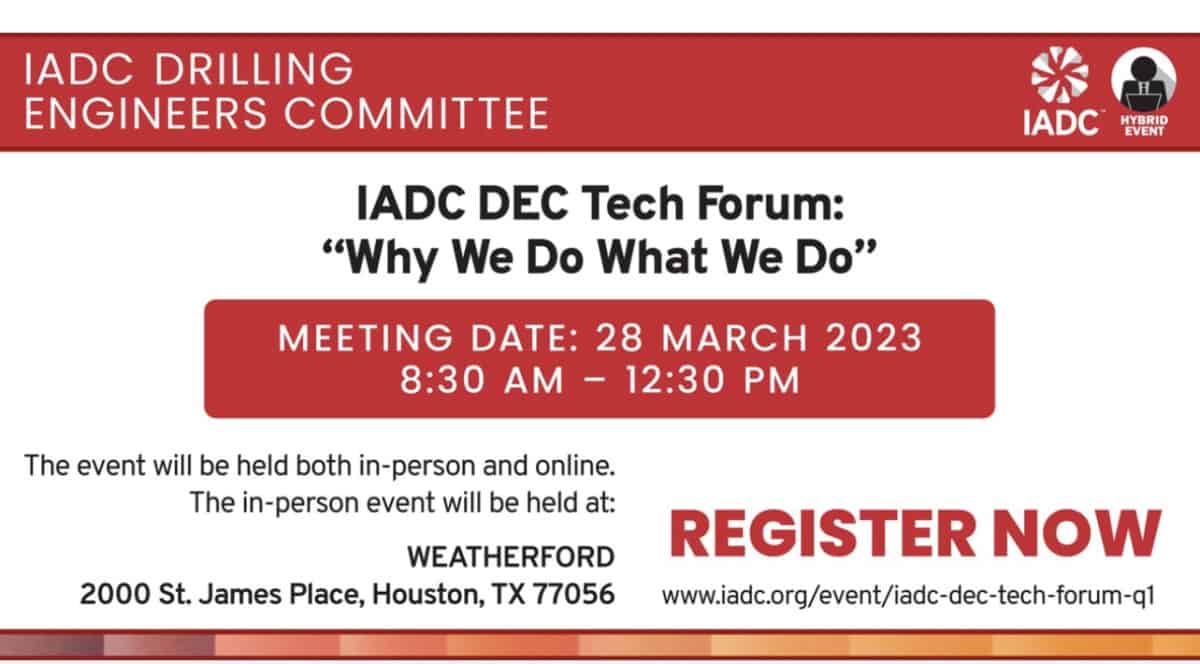
IADC DEC Tech Forum – “Why We Do What We Do” MARCH 28, 2023 – Houston
This Event Reminder is Sponsored by:
28 March IADC DEC Tech Forum – “Why We Do What We Do”
Drillers find ways to get things done. They also find ways to break things like they’ve never been broken before! Technologies and techniques have been deployed with great promise, expecting to revolutionize the industry, only to meet insurmountable challenges. What lessons learned would we all want to tell our younger selves?
This forum is meant to share things we’ve learned along the way so the next generation can benefit from hard roads traveled. It is designed to be informal, social and fun. Understanding from our past incidents and ability to fail, as well as learn fast, is key to finding agile ways of working and creating a culture of innovation.
The event will be held in person at Weatherford, 2000 St. James Place, Houston, TX 77056. An online option via Zoom will be offered for those who can’t attend in person. Register on the IADC website for either in-person or online attendance. Special thanks to our event host Weatherford!
Agenda:
08.30-08.40 Welcome – Matt Isbell, Chairman, and introduction to event – Blaine Dow, Todd Fox and Karma Slusarchuk, DEC Board members
08.40-09.00 “Western Gas Delays in Starting Up Remote Operations Center,” Todd Fox, H&P
In the late ‘90s, Western International Gas & Cylinders, an acetylene wholesaler, had three remote facilities within the Dow/Union Carbide Ethylene plants that were used to compress acetylene and fill trailers with approximately 100,000 cubic feet of acetylene per trailer. They had previously suffered a detonation when filling a trailer and were heavily focused on technology to prevent reoccurrence. The story details the fear, hesitation, technical leadership, and ultimately trust of the owners to transition to fully autonomous compressor stations/filling plants that are still in use today as well as lessons learned.
09.00-09.20 “The Rise, Fall and Recovery of Drilling in the ‘90s,” John de Wardt, DE WARDT AND COMPANY
Published in 1990 as a new style of outcome-based contract, the program envisaged an intention of the operator to shift from “doing” to “supervising,” through suppliers taking greater responsibility for their results. The IADC Drilling Contracts Committee requested the operator present themselves to debate contractor issues published in a newsletter under the title “Playing the Shell Game.” We did.
Successes with drilling contractors performing on turnkey, footage and bonus schemes were followed by service companies offering integrated services with bonus schemes. These contracts went out of vogue in the late ‘90s, only to return again in the 2000s as Integrated Project Management schemes. Meanwhile alliances followed the same roller coaster. Lessons will be drawn as well as the observations from a post-mortem review after the fall.
09.20-09.40 “Early RSS – Technology for the Desperate?,” Blaine Dow, SLB
In the late 1990s, Rotary Steerable technology was still in its infancy. Some projects had reached directional drilling technical limits, however, and a Hail Mary was required. Two projects in Eastern Canada, both with uniquely different challenges, represent examples. Harsh conditions stressed the tools to their limits. Survivability…and recovery….were not guaranteed. But through perseverance, both projects helped break ground for what the technology has become today. This discussion will be a reflection of the drilling challenges that ultimately led to the need for RSS trials, and the ensuing learnings that led to its evolution.
09.40-10.00 “Origins of Managed Pressure Drilling,” Dennis Moore
MPD has gained a lot of traction over the last several years. There is a large body of literature giving many examples of where and how it has been used successfully. It is interesting to examine where it came from and how it evolved into what we see today. This discussion will follow its development from one first-hand perspective.
10.00-10.20 “History of Hard Rock PDC’s: The Yucca Mountain Project,” Roy Long
The Iranian Revolution concluded in February 1979; and oil reached its first inflation-adjusted high of $100/bbl the following year. In response, interest significantly increased in the U.S. for development of unconventional resources and expanding the use of nuclear power. Characterization of Yucca Mountain, Nevada, as being suitable for long-term storage of high-level nuclear waste was an essential first step toward any nuclear solution.
Site Characterization required air coring brecciated volcanics to approximately 2,000 feet while leaving the borehole as close to an in-situ condition as possible. Yucca Mountain was one of the first extensive uses of PDC’s for drilling/coring hard volcanic rock. This was the beginning of the development of advanced PDC’s and other technologies that would positively impact drilling capabilities in the oil and gas industry. This discussion will focus on the PDC coring and the Dual-wall drilling system that enabled the sampling for studies that led to a successful license application.
10.20-10.35 Break
10.35-10.55 “How a Field Failure Changed My Career and Helped Reveal My Purpose,” Aron Deen, Varel Energy Solutions
In the spring of 2008, I overheard a Drilling Manager say, “It’s never been done before.” That comment inspired me to invest 6 months of my professional life, succeed beyond expectations, and simultaneously fail so miserably it sent me into a depression. The failure revealed a profound question that changed the trajectory of my career and life. In this talk, I will share this story about drilling performance and product development – and others like it – to teach how to apply its lessons to improve the ROI of every project you work on.
10.55-11.15 “The Vital Role of Non-destructive Testing (NDT),” Kelly Northcutt, Wellbore Integrity
Non-destructive testing plays a vital role providing dimensional, wear, corrosion and cyclical fatigue information. Over the last 40+ years, operators, drilling contractors and service companies have worked together to improve the overall life span/performance of rotary drill strings. Prior to 1992, inspection service companies performed inspections as per API RP7G-2, API Spec. 7-2, API 5A5, API 5CT, various other API procedures, and company-written procedures. Around 1988, an engineer discovered inconsistencies in the inspection process as it related to using various inspection companies performing standard BHA inspection services. He discovered a gap in procedural compliance and began to build an inspection standard that today we know as the DS-1 Standards. When you make a site visit in today’s oil and gas fields, almost all inspectors can produce appropriate certification documents ensuring a baseline level of competency; 20 years ago, that was not the case.
11.15-11.35 “Improving Product Development Procedures and Testing Matrixes,” Justin Gauthier, AES Drilling Fluids
While attempting to break into a new market, we developed a new product to help with torque reduction that proved successful in the lab at a highly competitive price. After several months of lab testing and strategy meeting with a targeted customer, we were finally given an opportunity on a single pad with a new customer.
On the first well of the trial pad, the product was added and after roughly 72 hours of drilling, the drilling fluid system became very thick, contaminated, and unpumpable. This resulted in the rig having to completely displace the mud system and start from scratch which resulted in getting ran off the job. After conducting an after-action review of the lab testing and investigation, it was proven that there were contaminants in the field brine that weren’t accounted for in the initial phase of product R&D. The financial implications and resources that were allocated in attempt to solve this problem were not only impactful internally but made it difficult to provide further services to the subject customer.
While this event proved challenging at the time, we quickly realized that we needed to improve our product development procedures and testing matrixes. Following the subject event, we have successfully deployed similar technology with a very high success rate, which has ultimately led to increasing market share with the very same customer that we had the failure with.
11.35-11.55 TBD
11.55-12.15 TBD
12.15 Adjournment + lunch
For more information, contact Linda Hsieh, linda.hsieh@iadc.org, +1-713-292-1945, ext 219.
Follow UpstreamCalendar.com for upcoming industry events. Upstream Calendar was created to help the industry to synchronize by providing a free lookahead for KEY industry events across the country. We focus on non-profit support, community, and industry specific 2022 Oil and Gas trade shows and conferences for Upstream, Subsea, Offshore, Downhole, Cementing, Completions, Fracking, Pumping, MUD, etc. We are FROM Upstream, FOR Upstream and believe in Networking With A Purpose.
Email Efrain@AllstreamEP.com to get involved.
2023 Oil and Gas Events Houston
2023 Oil and Gas Events Texas




Recent Comments